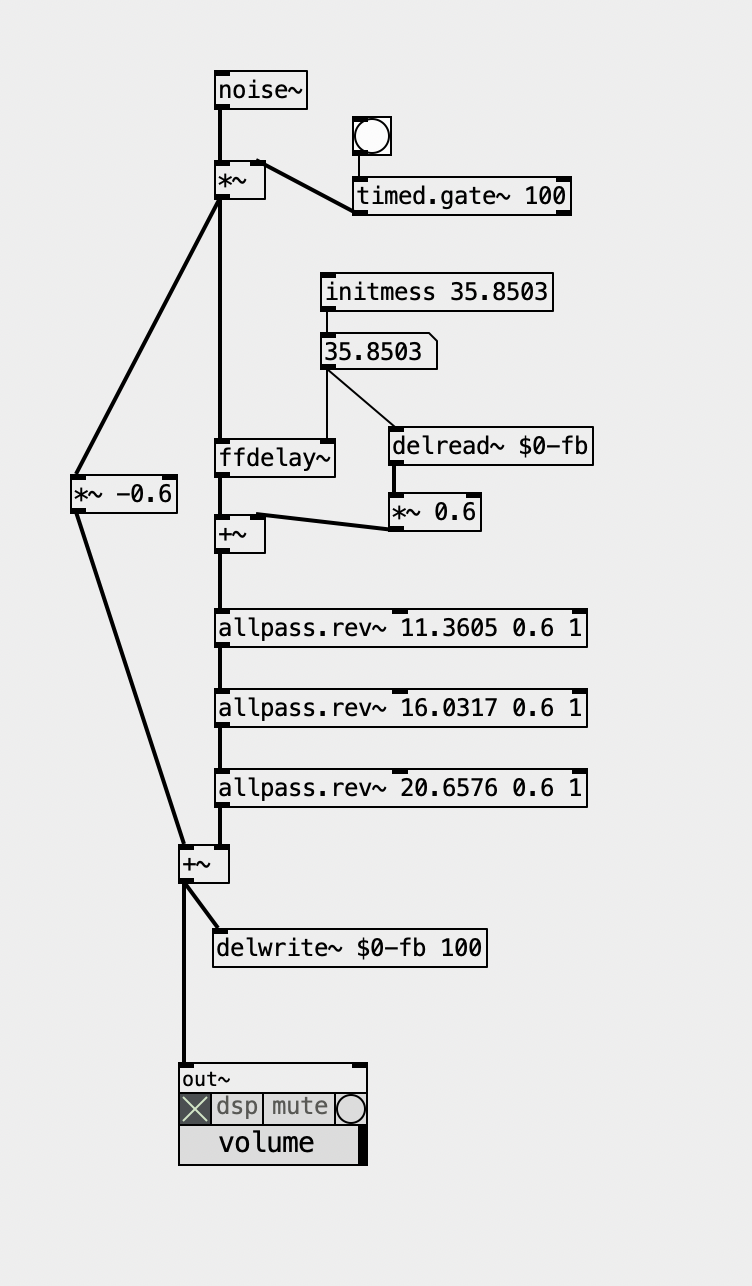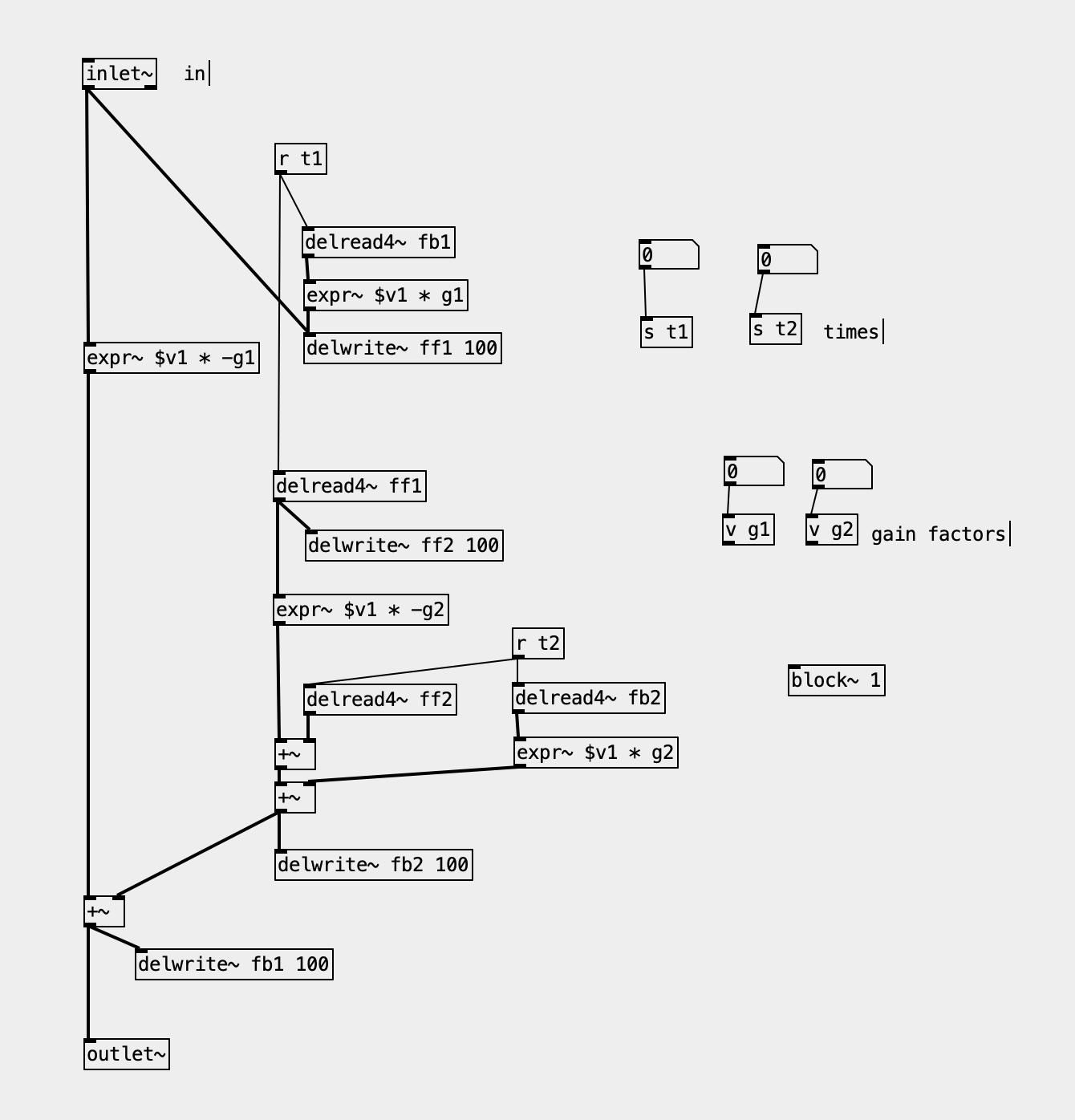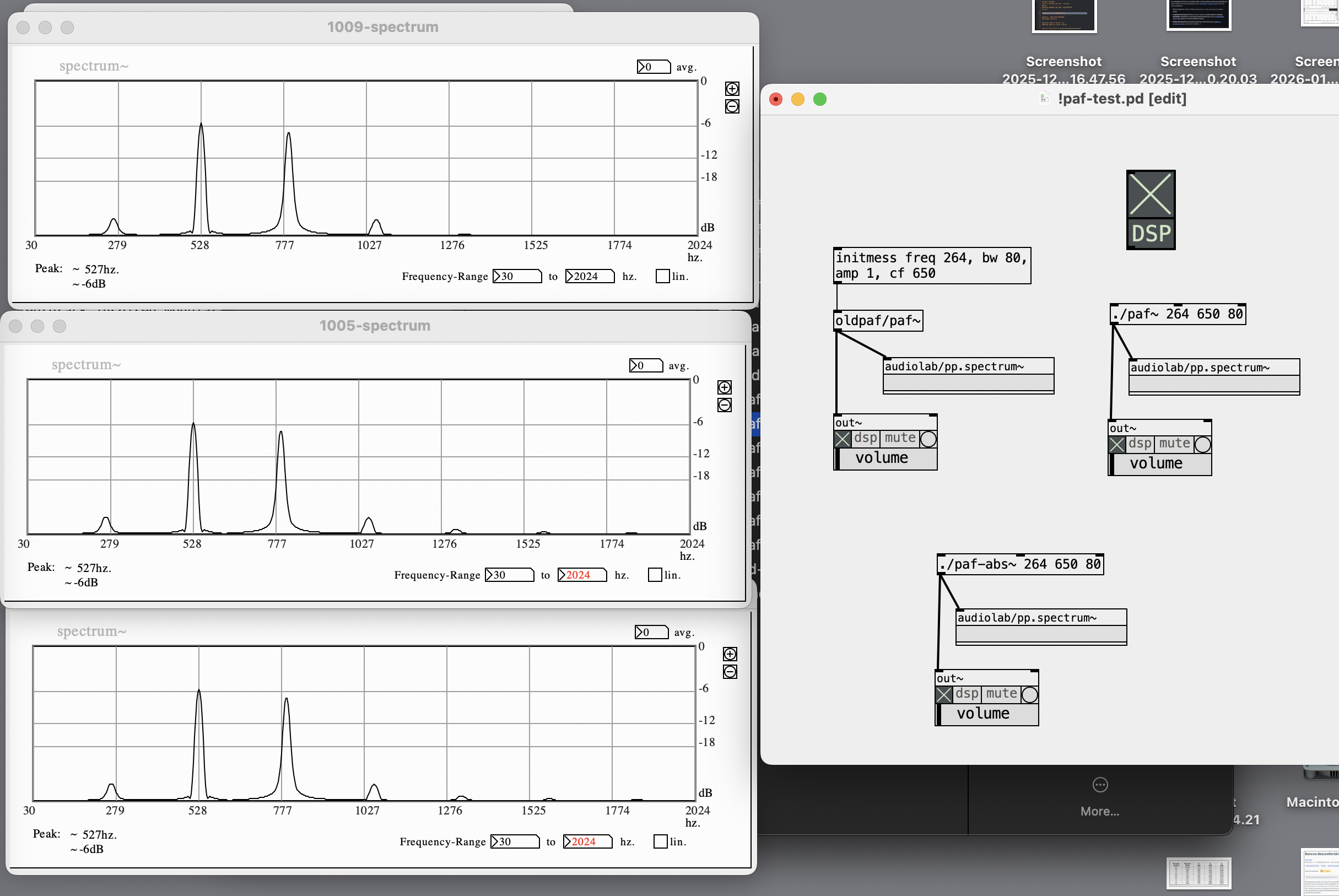-
porres
posted in news • read moreCelebrating the 10th anniversary (yikes, a whole decade of my repository today (February 21st 2026), I have wrapped an update for Cyclone. Check https://github.com/porres/pd-cyclone/releases/tag/cyclone_0.9.4 and find binaries in deken for mac/linux/windows and raspberry pi. And please let me know if you have any problems with these binaries!
Last year I made a minor update (0.9.3) a couple of months after the 0.9.2 release, but I never formalized a release update with binaries into deken and an announcement. Let's just skip that, but here's the changelog for 0.9.3 while we're at it:
- Fixed bug in [unmerge] where it wouldn't deal well with mixed floats and symbols in a list
- Fixed crash and resize bug in [zl.group]/[zl.stream]
This one made it into the PlugData 0.9.2 release recently, by the way.
I was actually hoping I'd have a 1.0 right now to celebrate my 10 years involved with Cyclone, but I failed miserably. The plan is to release that along with PlugData 1.0 as well, whenever that happens (some updates to [mtr] is what's missing for me to call it 1.0.0 already, by the way).
So anyway, here's 0.9.4!
Many cosmetic changes in this one, which I'm kinda proud of. I did finally add a menu entry so people can disable the object browser plugin, while I also improved it to include browsing in more nesting level depth.
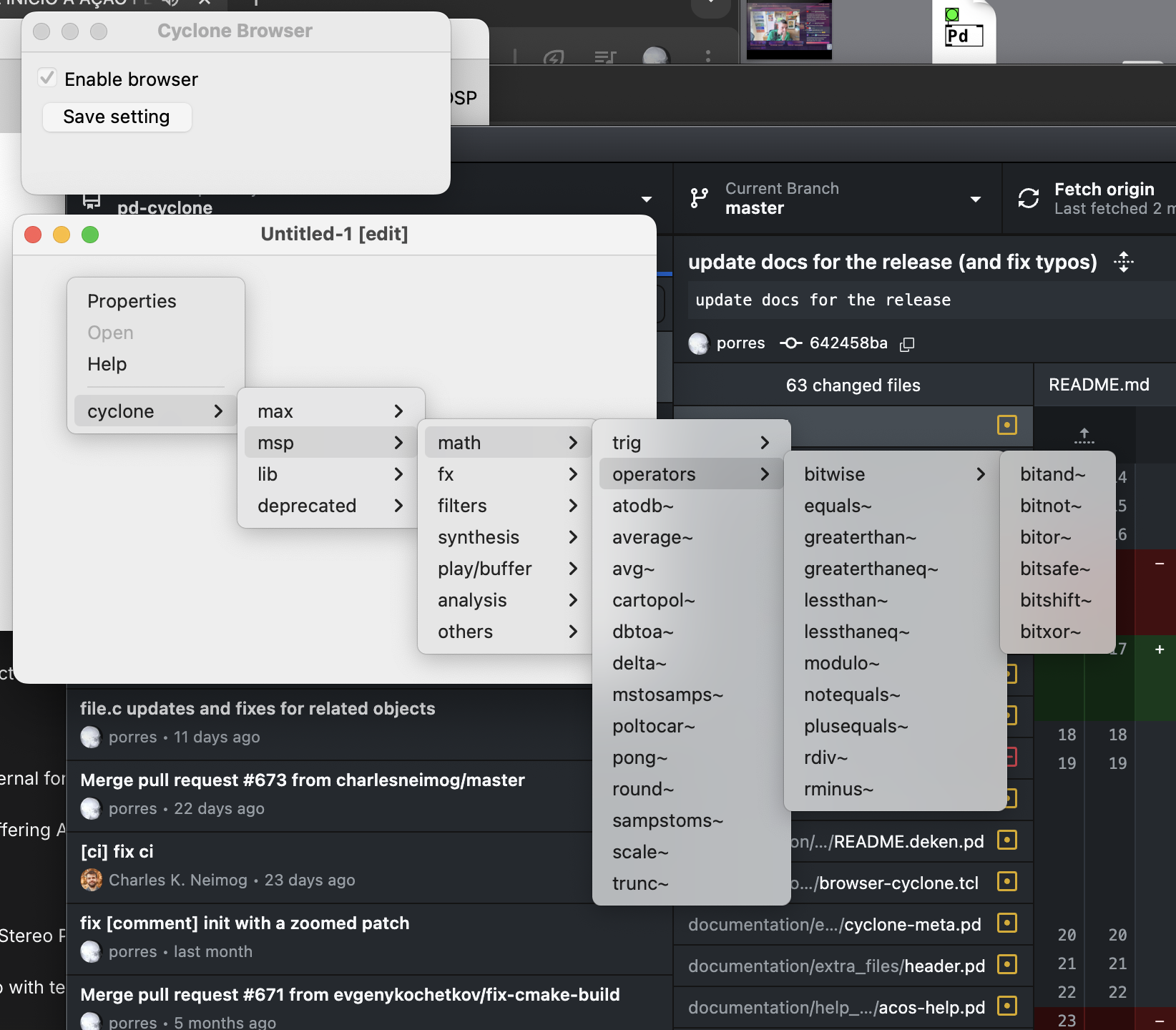
So, if you think my beautiful and hard work designing a nice plug-in browser is not welcome, you can go to Preferences=>Cyclone-Browser-plugin and disable it.
Other more cosmetic changes are that I made some updates to the text editing window of objects like [coll]. One of the things is that it now uses Pd's "theme" colors in it (so Pd >= 0.56 is needed)! I also made some other changes like being able to use CTRL+S to save and CTRL+W to close the window. Also, typing and editing it on the window now marks the patch as dirty if you have the "@embed" flag enabled (same is true for [table]).
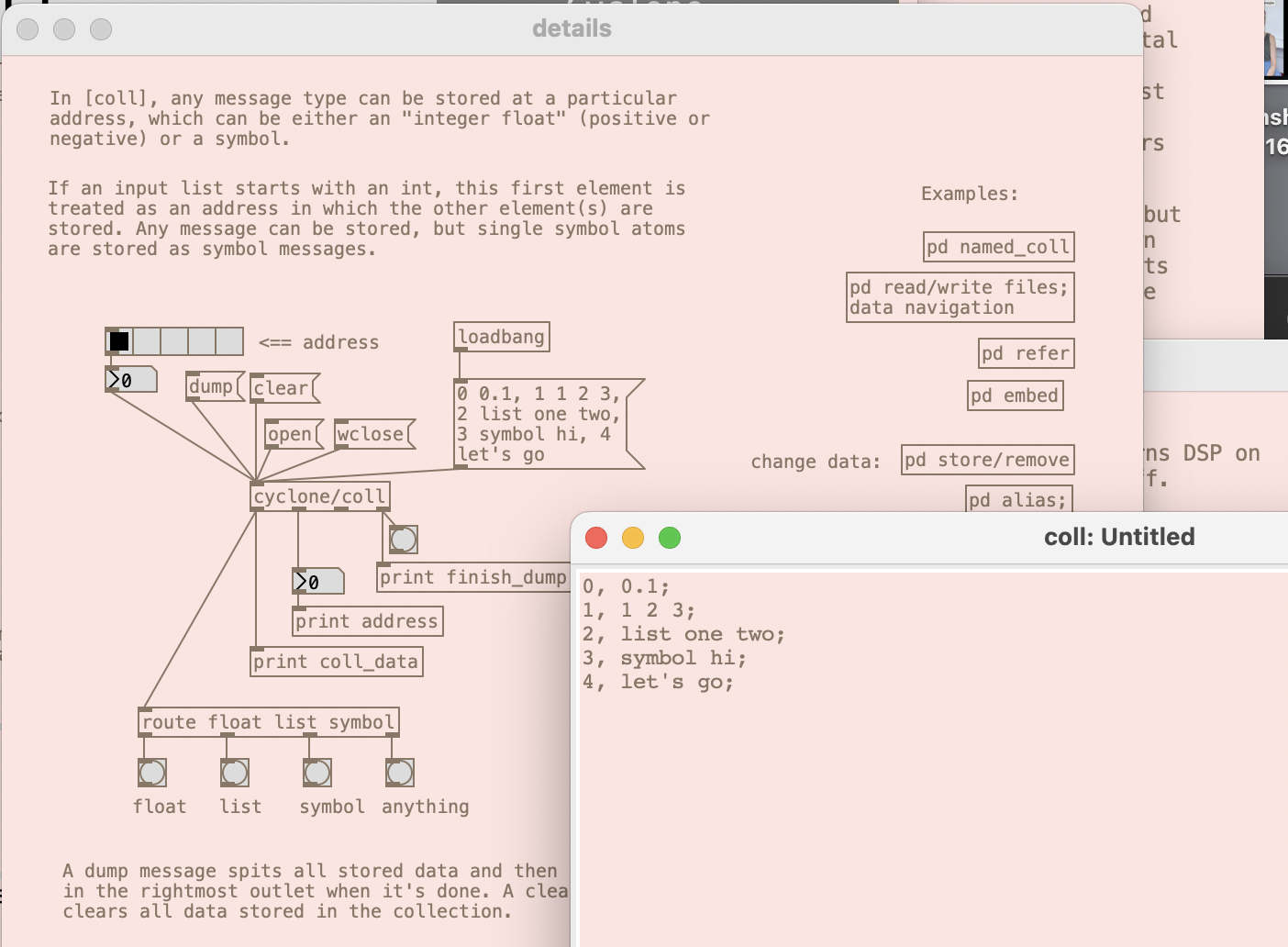
There are some other bug fixes, and here's a full changelog if you're curious about all the details.
CHANGELOG:
- We now have a preferences menu to disable the browser plugin! See Preferences => Cyclone-Browser-plugin. If you always hated this, disable it and save the setting. The browsing plugin is now also better organized with more nesting levels.
- [prob] removed the functionality for viewing the data because the MAX original doesn't have it and it makes no sense, cause we can't edit it and save it and you can already see the data with "dump" (which prints on the terminal window). When embedding, now we also have a dirty flag when setting data, just like [cyclone/coll] and [cyclone/table] (even though the MAX original doesn't do it).
- Text Editing Window Improvements: colors now adapt to Pd's theme (so >= 0.56 is needed) and font size also adapts to patch's font size. Allow ctrl+s to save and ctrl+w to close the window. This affects [cyclone/seq], [cyclone/coll], [cyclone/table] and [cyclone]/[capture~] (again, [cyclone/prob] doesn't have it anymore). Also make manually editing the window and saving it sets the dirty flag on the patch for [coll] and [table] (and not only with changes via messages as before).
- [coll]/[table] improved dirty management as it wouldn't mark dirty if the owning canvas wasn't visible (which was a stupid hack to not mark it as dirty when loading the patch).
- [coll] now forces a correct order of args and deals with 0/1-length list messages.
- [table] fixed trying to open the name argument as if it was a file. Now resizing updates the editing window if it is opened.
- Improved [cross~], it is now a 4th order filter (even though Max claims theirs is a 3rd order filter). The last one didn't sound good when adding the lowpass and highpass output.
- [scope~] improved resizing handle mechanism
- [comment] fixed "mouse release bug" annoying error and initialization with a zoomed patch.
- Fixed many typos in the docs.
- Improved github actions and added Raspberry Pi binaries
- Fixed CMake build for compiling a single binary
Cheers
Alexandre Torres Porres -
porres
posted in technical issues • read more@ddw_music said:
Pd does spit this information out of soundfiler at the moment of loading, but if you didn't retain those values at that time, then they're gone.
by the way, the [else/sample~] object loads any sound file into internal buffers (with any number of channels). It does like [soundfiler] and spits it out right away, but you can query it any time with the "info" message.
It's also important to say that PlugData comes with "all batteries" included, with the ELSE library for example.
I don't mind Vanilla's interface too much, but that's cause it looks on on the mac. It's definitely dreadful in Windows/Linux though. But what gets me the most is how it lacks some important stuff to make music. Max is not that all too complete I'd say as well. SuperCollider has a nice built in collection of tools though.
-
porres
posted in technical issues • read more@_ish said:
extracting BPM from a soundfiler
you can use [else/beat~] for beat detection of live input by the way
-
porres
posted in technical issues • read more@Obineg said:
the max external for example does not support signal input, therefore a custom patch is there also preferred.
why?
only reason I can think is if you wanna do FM, which is unlikely. In the code we have signal ramps by the way and it's more efficient
-
-
porres
posted in technical issues • read morehere's the CSound triple nested example from that tutorial translated to Pd using objects from ELSE.
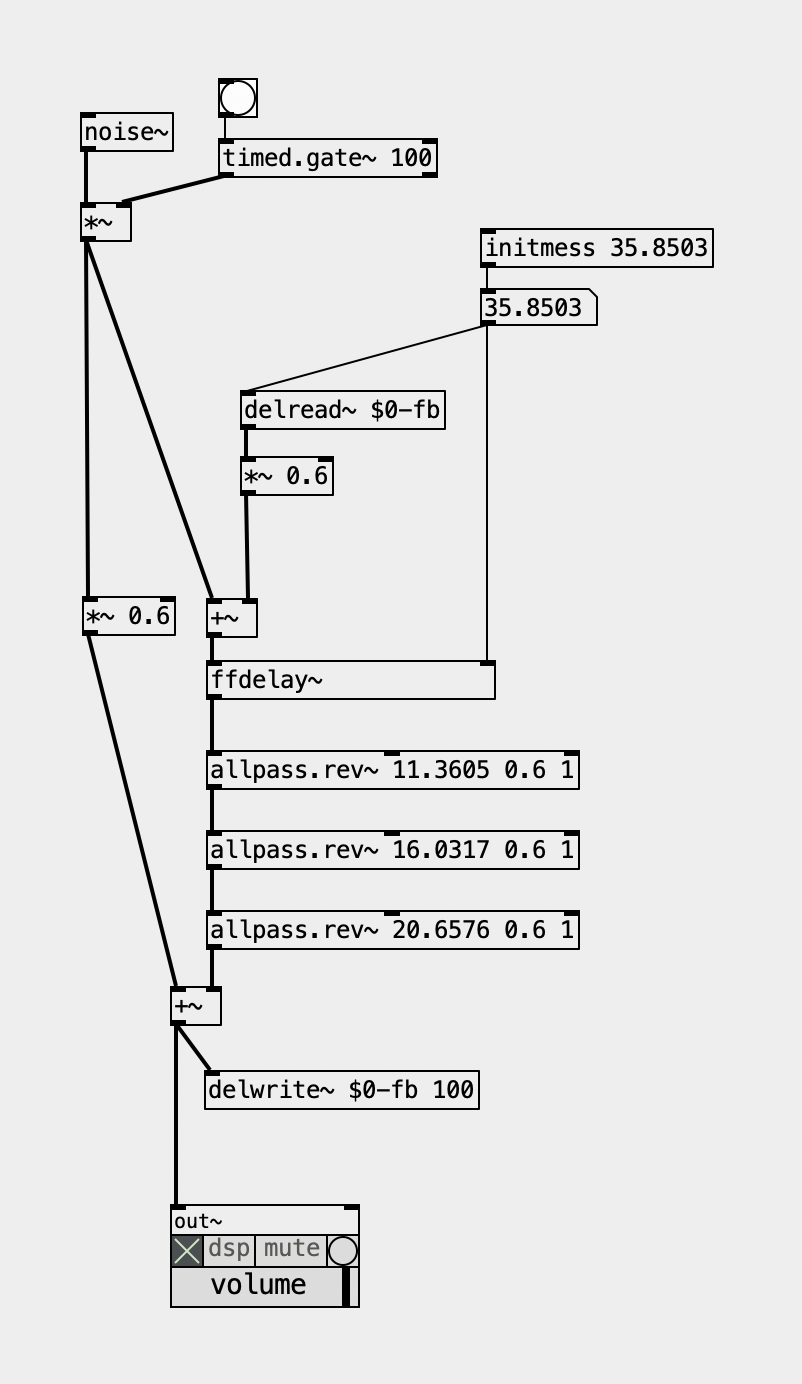
-
-
porres
posted in technical issues • read morewhat you need for reverbs is not a 1st or 2nd order allpass filter, but an allpass reverberator with a delay time, so forget about H14. Here's a proper allpass unit from my tutorial
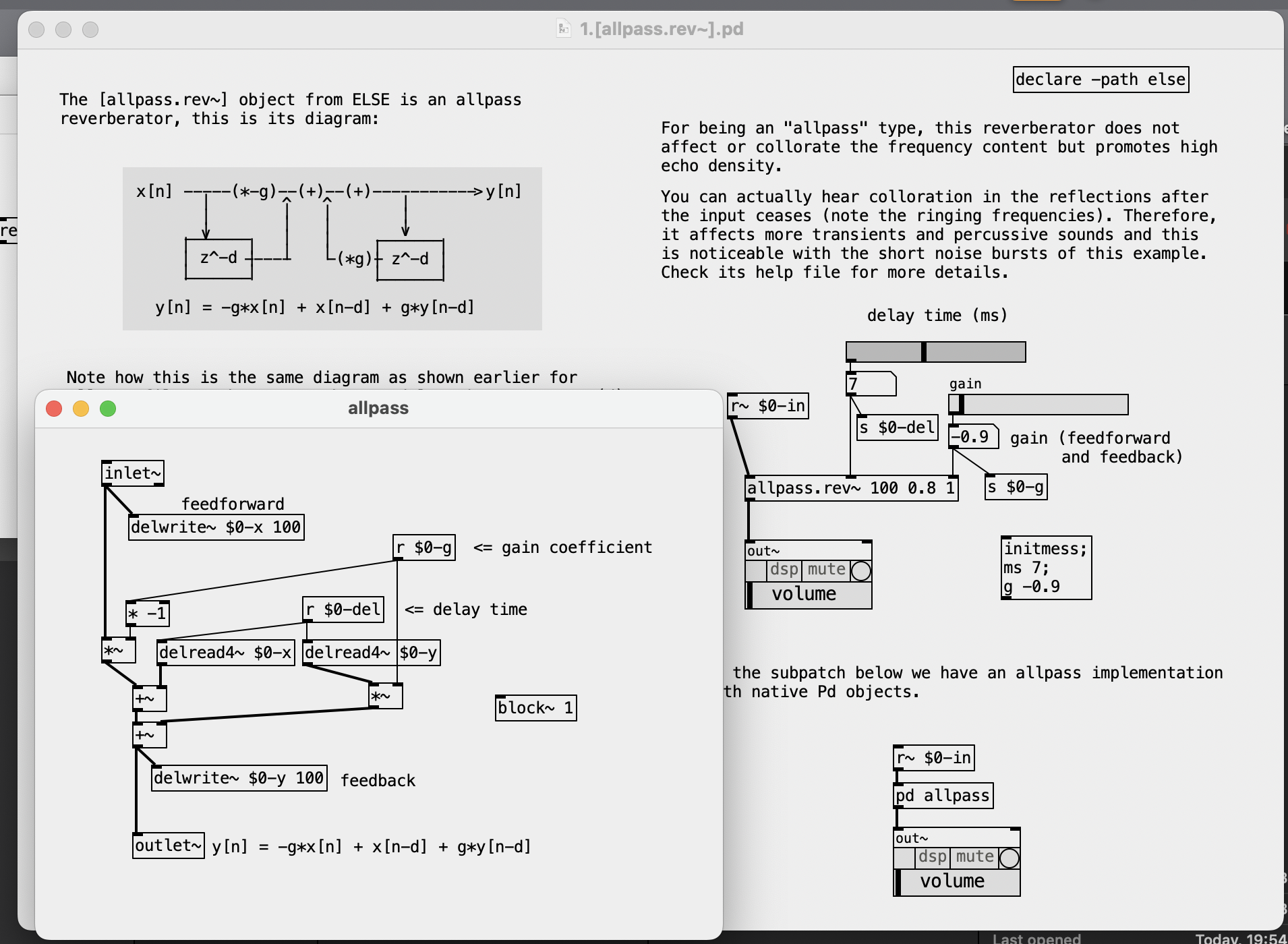
This is where the example is and I'm sending another screenshot as the one before isn't showing somehow
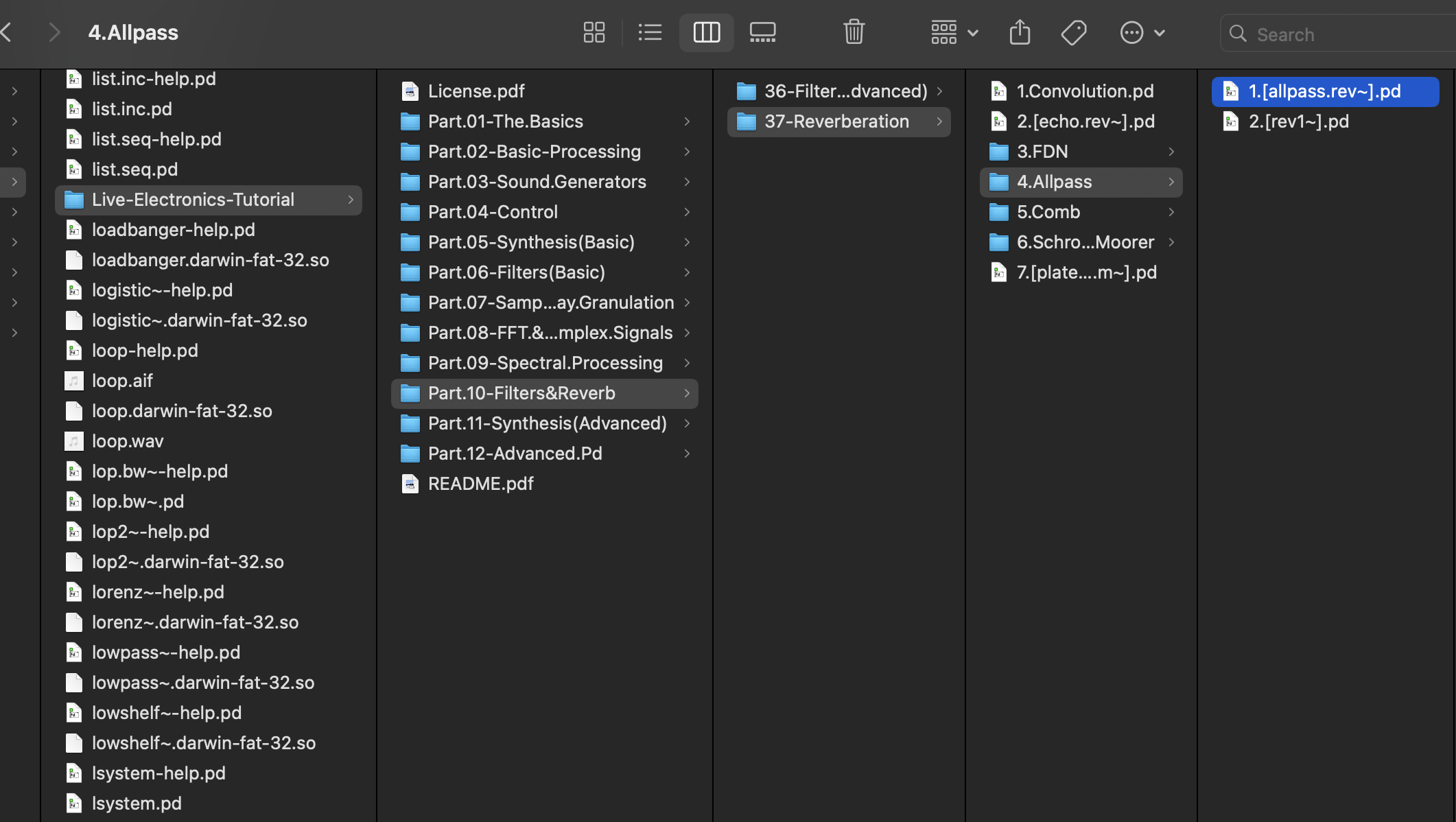
-
porres
posted in technical issues • read moreHi, I have a deep section on filter theory in my tutorial, and how to build some reverbs with it and comb filters. It is part of the ELSE download!
Screenshot 2026-01-13 at 19.48.07.png
Also, note that [rev1~] uses a series of allpass filters in Vanilla, but not a nested one. Give me a minute and I can try and make nested ones.
@Ice-Ice by the way, please don't use illegal arguments in inlet/outlet objects, it's not a good practice.
-
-
porres
posted in technical issues • read moreFor the record, formant~ was now also added, so I have formlet~, formant~, vosim~ and paf~ (all with multichannel support) already inclued into ELSE, and I'm gonna stop here for the time being...
-
porres
posted in technical issues • read more@ddw_music Thanks for the clearer explanation.
To reiterate: the code is exactly the same on any OS. That was the point of my question “what Windows code?” — to indicate that there is no such distinction. I was not asking anyone to debug my code. I was asking for a more careful identification of the actual issue, rather than assumptions about OS-specific behavior that does not exist here.
If you're gonna claim something, you gotta have something to back it up...
I don’t have access to Windows. I haven’t used it for over two decades. This is volunteer work, and I would expect a minimum level of respect and collaboration instead of being blamed because early, experimental code is not yet working on Windows.
Making confused claims without being able to properly test or report the issue is not helpful. It did not feel to me like there was an intent in trying to help; it felt like complaining, while also stating I shouldn't expect people to debug the code for me...
If there is no interest in helping—and not even in supporting the work financially—then it’s better to disengage. So yes, sorry if I wasn’t patient enough in my explanation.
And the most incredible confusion here was to assume I had a different algorithm that wasn't supposed to be called "paf", which was "invented by someone else" (who cares anyway?). So, to be cristal clear, this was simply a bug on windows where, for some obscure reason outside of my reach, the compiled code behaved differently. This was supposed to be evident when I, for multiple times, proved that the object was working as intended on macOS. So it was clearly the same technique/algorithm.
Having said all that, I’ve now implemented multichannel support in the object and asked an AI for hints about potential cross-platform issues. I made a few changes and tested them on a virtual machine, and everything now seems to work.
I honestly don’t know what, if anything, actually fixed the problem. I didn’t really touch the paf source code itself; I only made some minor changes to the buffer.c dependency.
see https://github.com/porres/pd-else/actions/runs/20669314244
And a screenshot
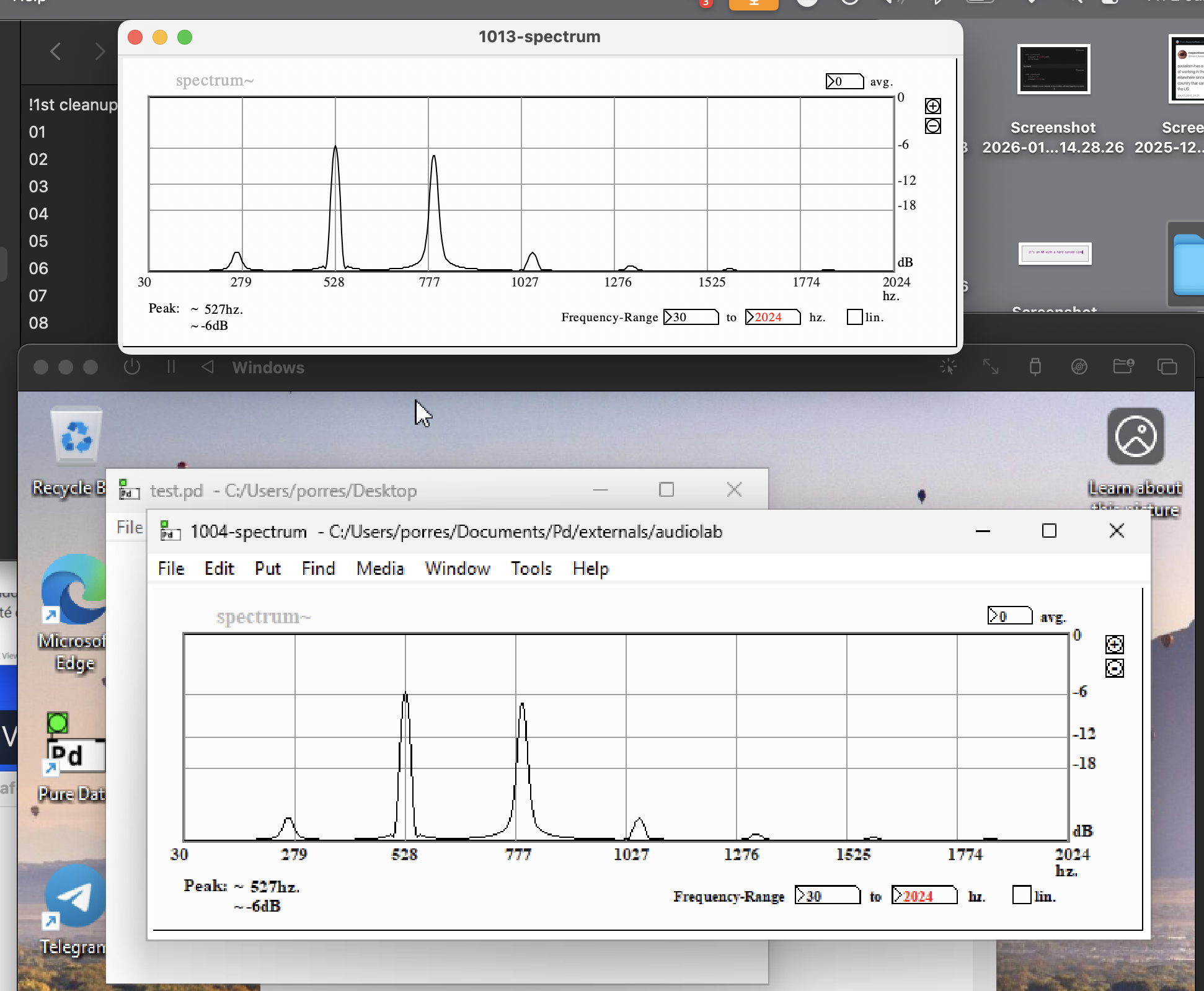
-
porres
posted in technical issues • read more@jamcultur said:
Don't you care whether it works properly on Windows?
I do and, like I said... I WILL GET TO THAT LIKE I SAID... AS THERE'S NOTHING TO BE DONE NOW... can you take a moment to breathe and read carefully what I've been saying?
I don't feel you're not listening... you're also not being very helpful...
you're being very annoying actually and saying some funny and wild things by the way
 like what I should do and how I should call the object.
like what I should do and how I should call the object.Let me put it in a different way and be done with this. Right now I actually don't care this is not working for you! The object is still not included officially. It is still experimental and not officially distributed. It is not even completed... So you're gonna have to leave me alone please for the time being, unless you can really help. If you can't, leave me alone please... I see it's not working for you, I got it. Like I said a million times, I have no idea what might be going on... ok? Can we move on?
thanks
-
porres
posted in technical issues • read more@jamcultur said:
If the code on Windows was the same as the code on Mac,
why don't you look at the code and point to what you believe is the culprit instead of just making assumptions. My code is the same for mac, windows and linux... I said so. There's no code just for windows. I can't see why it would compile differently for windows as well, which is something else to consider... and this would mean that probably a lot of ELSE objects behave different on windows, maybe, and I think it's unlikely...
anyway, we can't go around in circles forever so I am moving on with this already, like I said... for now, all I can say is "I can't see what might be causing this", and "I can't reproduce it"... and "this is still experimental and I don't have to do something about it just now when we don't have a clue of what is going on, so let's put a pin on that"
-
-
porres
posted in technical issues • read morea comparison of miller's original paf (version 0.07), an abstraction based on F13 and my external. The abstraction is the one at the top and differs a bit. My external matches exactly miller's original and it's actually based on it so it's the same code...
we have to stop going around in circles here...
I see you're getting different results on windows. Makes no sense to me, I don't believe there's something in the code. Unless you have a real suggestion and can narrow something down of find the problem, I can't do anything.
I say let's just put a pin on this...
The object isn't even officially included or done. Let me work on it... when it's time to put the update release out I will have a look at it. Try to run on a VM or something.
-
porres
posted in technical issues • read more@jamcultur said:
I made a module using the implementation of paf~
what kind of "module"? How did you "do it"?
please be precise
-
porres
posted in technical issues • read more@jamcultur said:
There is different code running on Windows than on Mac. That must be where the problem is.
what exactly do you mean?

